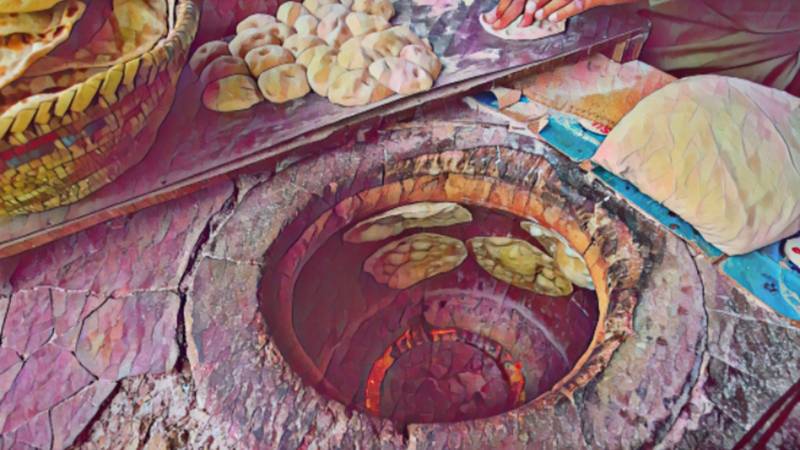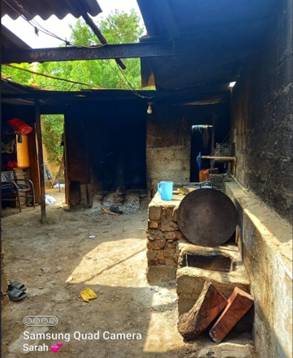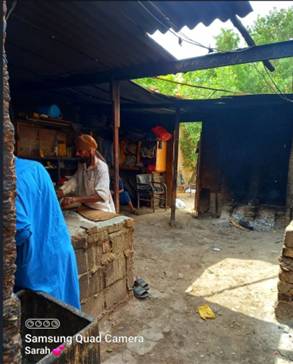
At a previous job, when needing a quick reprieve from work or to satisfy a random craving, my colleagues and I would often visit the roadside dhaba outside our office building. This was a quaint looking setup, typical to any other dhaba you’d visit. Apart from your regular items (chips, biscuits, cigarettes, chai, and drinks), they sold a variety of meals that had a lot of consumers.
An ex-colleague recently and very randomly mentioned the dhaba – which naturally had me revisit my old haunts. And a trip back had me notice an intense pair of eyes peering at us from the back end of the dhaba. Perched atop the tandoor, I wondered if the focus was on ensuring the chapati didn’t get burnt or did it have to do with seeing girls at an otherwise male dominated area. Having gone as a mixed group, we decided to find out and invited him to chai – at his own dhaba, to which he graciously agreed.
He seemed young; his parents hailed from Interior Sindh, but he was born and raised in Karachi. After that first chai round, he asked: “Ab aap poocheingi mein iss tandoor pe kyoon?” (Now you will ask me why I work at this tandoor). His Urdu was clear, devoid of any accent.
“No,” I replied.
“Then, why the hospitality?” he inquired, one hand trembling. He saw me noticing the hand. “Mien charsee nahi houn …” (I am not an addict).
“Ghareeb ho …” (You are poor), I said.
“I write stories,” I told him.
He faced me again: “Aap meri kahani likhu gey?” (Will you write my story?).
“No,” I replied. “But I will ask you something and I hope you will answer honestly.”
He stared at me: “I cannot afford a decent meal during day, but I can afford to tell the truth.” He was Sindhi but continued to amaze me with his Urdu.
Awestruck by his reply, I continued: “While introducing yourself to us, you mentioned that you have no home, no family, nothing …”
“That is true,” he said, looking back at the chai-wala again.
“What happened to your family?” I asked.
“Pata nahi,”, he said, shrugging his shoulders. “They were extremely poor. So, I ran away from home; I grew up on the streets and lived there ‘Kuttay k maafiq’ (like a dog).”
The chai arrived.
“So can I ask my question now?” I requested. He nodded, while sipping his chai.

“Have you ever wanted to kill someone you thought is responsible for your poverty?” I asked point-blank.
He kept sipping the chai, entirely unperturbed by my question. After about a 30-second gap, he replied: “Jee … Khud ko” (Yes. Myself).
“Why? Because you are poor?” I enquired.
“No,” he replied. “Iss tandoor k ilawa mein kuch bhi nahi (I am nothing apart from my tandoor).”
“But working at the tandoor is better than begging – your previous occupation,” I said.
“Millions are poor,” he replied, almost immediately. “But not all of them beg or end up at tandoors,” he said, turning to face me again.
I nodded and shared another perspective: “Many rich people claim that suicide bombers end up as such because they are poor, ignored and uncared for …”
Eyeing his chai: “Unn mein Khuda ka khauf khatam hogaya hai …” (They have lost the fear of God).
“They believe they are doing it for God,” I replied.
“I used to beg in the name of God,” he retorted with a half-smile. “Does that make begging right?”
I smiled back: “I personally have no problem with what you do. Illiteracy, poverty, and negligence can lead a person to all possible ‘ends.’”
“Have you ever begged?” he asked rather nonchalantly.
I replied with an obvious no. “But you already knew that”.
“Why are you asking me all of this? Even as a tandoor wala today, I will always be known as the beggar. A nobody. Do you think I am a terrorist?”
Reverting to his indifferent self, he snickered: “As a beggar, I knew so many other poor people who resorted to crime out of desperation. They became thieves and are all in jail now.”
“Khuda ka khauf khatam hogaya hai …”
“So, you define a thief as somebody who believes that society has treated them badly? That they have lost their fear of God?” I asked.
He shrugged Him shoulders: “If I couldn’t justify my begging, how can they justify their stealing?”
“But you can justify your begging,” I said.
“No, I can’t” he replied.
I persisted: “People often think terrorism is because of poverty and injustice. Do you know that a lot of terrorism (today) is done by young well-to-do folks?”
Sipping his tea: “Khuda ka khauf khatam hogaya hai.”
I noticed the chai wala continually turning his head and looking at his tandoor wala colleague – possibly to keep tabs on our conversation.
I offered the tandoor wala a cigarette. He took one and I continued: “My name is Sarah”.
“You are very interesting,” he smiled. “You didn’t ask me why I begged, how I ended up here, whether I have drugs on me …”
“Do you?” I asked. “No,” he said.
“Good,” I replied. “I don’t like drugs. Sometimes I drink, but not frequently.”
“Desi ya faaran?” (Local or foreign?), he asked.
“Donu, par achi quality ki” (Both, but of good quality), I smiled, now lighting myself a cigarette as well.

He extended a still trembling hand and took out the 100-rupee note that I had earlier given him: “You come off as a good person. I can’t take this from you because I will waste it on cigarettes and cheap liquor. But if you can, give me your cigarettes.”
“No, no; keep the money and the cigarettes” I said.
“Shukriya. Khuda aapko khush rakhay” (Thank you. May God keep you happy).
Before I could ask another question, he asked me one instead: “So why are well-to-do people doing terrorism?”
“I don’t know,” I shrugged my shoulders. “Confusion, maybe? Believing they are serving their faith this way.”
He slowly but dismissively shook his head: “Khuda ka khauf khatam hogaya hai. How can anyone serve his faith without first fearing God?”
“Or without respecting the life of His creatures,” I added.
Now the chai wala turned around and said something in Sindhi – to which he got a half smile.
“What did he say?” I asked.
“He says I have a lot to give”.
“Like what?” I asked.
“Merey pas khuda ka khauf hai …”. Saying this, he suddenly got up, shook my hand, thanked me for the cigarettes and walked away.
I told the chai wala that I liked what he had told his colleague. He nodded and mumbled (in Sindhi-accented Urdu): “Ache baat toh who kar raha tha …” (He was the one doing the good talk).
“Indeed,” I replied. I paid the chai wala and left the dhaba. Standing a few yards behind, the tandoor wala was gazing at something inside the tandoor.
He truly had nothing to give. And yet, I felt he had given me a lot. But I’m still not sure what.

